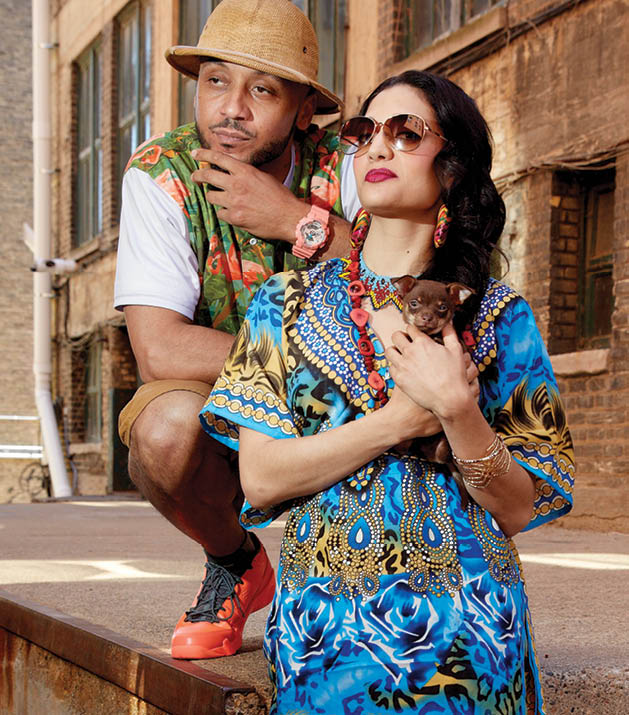If there is one word that best describes Maria Isa Pérez, it’s dynamic. The petite Latina hip-hop artist bounds through the door of Electric Machete Studios, an indigenous and Latino art collective on Smith Avenue, loaded down with a large computer bag and a hefty purse. “We hug here,” she says, leaning forward for a greeting before settling in for a conversation about her busy life, her work and her love for the West Side. Despite a packed travel and performing schedule, and time spent in Los Angeles working not only on music, but a burgeoning film career, the artist known as Maria Isa is firm in her conviction that Saint Paul “is always home.”
Singer and Musician
Isa was raised on the West Side with NuyoRican (New York-Puerto Rican) parents, Harry Pérez and Elsa Vega-Pérez, who moved to Saint Paul in the 1970s. Isa and her family embraced life so fully here that she refers to their house on Annapolis Street as “SotaRico,” which is also the name of Isa’s production company. Her family has always been involved in music and the arts. In 1992, Isa’s mother and aunt, a former Chicago jazz singer, founded El Arco Iris Center for the Arts, a nonprofit Saint Paul performing arts school focused on Afro-Puerto Rican arts and music, where Isa served as artistic director for two years, finishing her term in 2013. The following year, she accompanied a group of Arco Iris students to a hip-hop workshop in Puerto Rico, where she was proud to see them studying with some of the elders from the native Bomba music community there.
“I remember artists like Tito Puente and Celia Cruz coming to SotaRico after performing concerts in the Twin Cities,” says Isa, who grew up loving music, singing and theater. “When I was 4 or 5, I started being involved in productions at Teatro del Pueblo on the West Side, so acting was around me from a young age.”
Isa’s teenage years were transformative on many levels—socially, culturally and also physically. She attended St. Agnes High School in Saint Paul until 10th grade before transferring to St. Croix Lutheran in West St. Paul. A star on the basketball court, Isa was one of the only people of color at the school then, adding “I was the only one who recognized my Latina identity.”
“I began to surround myself in other ways with people who were involved in arts and activism,” she continues. Before long, Isa had become immersed in what she calls “the vibrant hip-hop community,” began sitting in on hip-hop sessions in local homes and studios, and was soon exposed to new artists from the Rhymesayers indie hip-hop record label, along with other performers including Mala Rodriguez, Asri Caribe and Los Nativos.
At the time, Isa noticed a definite lack of women on the hip-hop scene. “I took that as a challenge,” she says, “and thought, ‘Hey, I gotta rap.’” Isa began performing around town at events and festivals and in 2002, while still a teenager, founded a folkloric group called Raices.
“We would load up my uncle’s van with instruments and costumes and just started touring around,” she says, mentioning a trip to New York City to appear in the National Puerto Rican Day Parade. Performing with Raices “was when I really started learning the business end of music.”
Opportunities began lining up: Isa was a headliner at the B-Girl Be hip-hop fest in 2006, which coincided with her appearance as the first Latina girl and first female rapper on the cover of City Pages; she began to act, performing in Snapshots-Life in the City at the History Theatre in Saint Paul at age 18 (she would later star as Mimi in Rent at the Guthrie Lab Theatre); and founded new groups, including Villa Rosa with fellow hip-hop artist Muja Messiah. The duo, in a relationship for the past six years, recently released their third album together, LeMuria.
In 2009, at age 22, Isa released a solo album, Street Politics, and in 2014, the critically acclaimed Valley of the Dolls, which she refers to as “my bachelor of arts degree in the recording sector.” Isa attended Columbia College in Chicago for a short time, but even her advisor, who saw the career Isa was building, encouraged her to step back from school and take the opportunities that were coming her way.

Role Model
Not only does Isa feel committed to be a role model as a young female artist of color (“I’ve always wanted to take advantage of opportunities to open doors for other women in the same position as me.”) but she is also devoted to another personal cause. At age 16, Isa was diagnosed with Type 1 diabetes and is insulin-dependent. “I had to engage in learning about diabetes from the beginning. I didn’t want it to manage me because I’m managing all of this,” she says, waving her hand, indicating the busyness of her life. Isa makes time to give presentations to young people as well as to adults who share her diagnosis about the importance of education, diet, exercise and self-care. Additionally, she’s currently working on a musical children’s book about diabetes.
Actress
In recent months, Isa has been dividing her time between Saint Paul and Los Angeles as her career has begun heading in a new direction. Following her performance in Rent at the Guthrie Lab, Isa was cast in Strike One, a film set in the L.A. community of Boyle Heights, and starring Danny Trejo (Heat, Con Air and Machete) and Johnny Ortiz (star of ABC’s American Crime Story). In the film, which premiered at the Twin Cities Film Fest in 2014 and later at the Cannes Film Festival, Isa has one of the starring roles as the older sister to Ortiz’s character. The film was also screened on opening night at the Viva Latino Film Festival in New York City.
As a Puerto Rican, Isa says she found it challenging to play a Chicano in the film. “It was a barrier I had to cross for myself,” she says. “But being raised on the West Side, I have developed tremendous respect for the differences and similarities in our struggles.”
Later this year, Isa will begin filming Divided Loyalties in Boston and Puerto Rico. She’s also working on a studio project with music producer Andre Fischer, the former husband of the late Natalie Cole, who also splits his time between Saint Paul, where he is the executive director of the Twin Cities Mobile Jazz Project, and Los Angeles. Isa, who is involved with the Mobile Jazz Project, performing in community centers and other venues in the Twin Cities, calls Fischer “a mentor” and is thrilled to be working in the studio with him on music with its roots in hip-hop, Latin and soul. “I’m working on my master’s degree with [this project],” she says with a laugh.
Artist
Asked for a hint about her five-year plan, Isa doesn’t hesitate, ticking off directing (both stage and film) playwriting, creating more music and acting.
And through her multi-faceted career as an artist, Isa wants to continue to open up dialogue within the Latino community. “We’re all brown, we’re just different shades of it,” she says. “We may not be from the same tribe, but we are all tribal. The arts are a way for us to bridge our communities together,” adding that she sees Saint Paul as being “one of the greatest cities for artists.” It’s a place where Maria Isa knows she can always play a part.

(Maria Isa and Muja Messiah pose with the their latest addition, Prince El Chapo.)
Where to See and Hear Maria Isa
Maria Isa, along with Arianna Genis, is the host of Latina Theory, a Spanglish podcast on SoundCloud, focused on health, current events, politics, music and more.
The Boricua music of Maria Isa will be featured in The Palabras Project at the Park Square Theatre from July 8-17. The production features art, music and words inspired by Blood Wedding, a play by Federico Garćia Lorca. More info at
Styling Credits
Makeup Artist
Yvette Iris of Tanama Make Up
Master Hair Stylist
Stephanie Perez, CEO of The Chair On Fire
Wardrobe Stylist
Adriana Lisette









